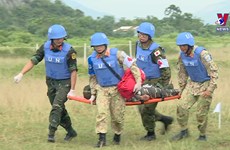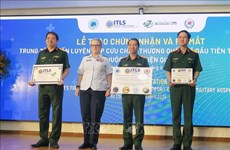WHO chief calls for more focus on MDGs
The WHO's Director General has called on the international
community to speed up fulfilling the three Millennium Development Goals
(MDGs) on health care.
The Director General of the World
Health Organisation, Margaret Chan, has called on the international
community to speed up fulfilling the three Millennium Development Goals
(MDGs) on health care.
While talking about the successes of 2009 and challenges facing the world this year, Chan said that preventing and combating A/H1N1 was a focal task last year, when the WHO declared the first influenza pandemic since 1968.
Although the epidemic has passed its peak in many countries in the northern hemisphere such as the US, Canada, the UK and some parts of European, the situation in India, Greece and a number of other Asian and African countries remains tense, said the director general.
Chan said that it was too early to announce an end of the pandemic worldwide and that it would be prudent and appropriate for the WHO together with member states to continue monitoring the evolution of the pandemic for the next six to twelve months.
The WHO chief also pointed out the progress made last year in the global fight against diseases, saying that for the first time the world has recorded more than 4 million HIV patients receiving treatment, this would have been unimaginable 10 years ago.
The mortality rate for children under five has also dropped below to 10 million for the first time in 60 years, while there was a 78 percent drop in fatalities from measles between the period 2000-2008, with African nations leading the way.
According to the official, the world is currently experiencing a 50 percent drop in child deaths due to malaria, as many countries have introduced proper interventions. These include using ACT combination drugs to treat malaria cases, increasing the use of insecticide-treated mosquito nets and spraying indoors depending on the country’s particular conditions.
Despite these results, Chan said that the world still faces various other challenges, citing the lack of progress in maternal mortality rates in many countries in Africa and across Asia, in particular India .
Another important area, which also falls under the overall scope of women’s health is violence against women and the international community needs to make more effort to put an end to this, she added.
The director general said that the health of women and girls is an important focus for the organisation and the world needs to work much harder to bring about changes in the devastation caused by non-communicable diseases. In many countries, 60 to 80 percent of deaths are due to chronic diseases.
From experiences learnt from different disease programmes, the world needs to draw up an agenda that ensures functioning and equitable health systems based on primary health care services. The global community also needs to address the outbreak of diseases, humanitarian disasters and deliver quality services and prompt interventions, Chan stressed./.
While talking about the successes of 2009 and challenges facing the world this year, Chan said that preventing and combating A/H1N1 was a focal task last year, when the WHO declared the first influenza pandemic since 1968.
Although the epidemic has passed its peak in many countries in the northern hemisphere such as the US, Canada, the UK and some parts of European, the situation in India, Greece and a number of other Asian and African countries remains tense, said the director general.
Chan said that it was too early to announce an end of the pandemic worldwide and that it would be prudent and appropriate for the WHO together with member states to continue monitoring the evolution of the pandemic for the next six to twelve months.
The WHO chief also pointed out the progress made last year in the global fight against diseases, saying that for the first time the world has recorded more than 4 million HIV patients receiving treatment, this would have been unimaginable 10 years ago.
The mortality rate for children under five has also dropped below to 10 million for the first time in 60 years, while there was a 78 percent drop in fatalities from measles between the period 2000-2008, with African nations leading the way.
According to the official, the world is currently experiencing a 50 percent drop in child deaths due to malaria, as many countries have introduced proper interventions. These include using ACT combination drugs to treat malaria cases, increasing the use of insecticide-treated mosquito nets and spraying indoors depending on the country’s particular conditions.
Despite these results, Chan said that the world still faces various other challenges, citing the lack of progress in maternal mortality rates in many countries in Africa and across Asia, in particular India .
Another important area, which also falls under the overall scope of women’s health is violence against women and the international community needs to make more effort to put an end to this, she added.
The director general said that the health of women and girls is an important focus for the organisation and the world needs to work much harder to bring about changes in the devastation caused by non-communicable diseases. In many countries, 60 to 80 percent of deaths are due to chronic diseases.
From experiences learnt from different disease programmes, the world needs to draw up an agenda that ensures functioning and equitable health systems based on primary health care services. The global community also needs to address the outbreak of diseases, humanitarian disasters and deliver quality services and prompt interventions, Chan stressed./.













